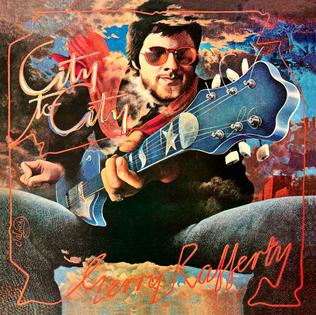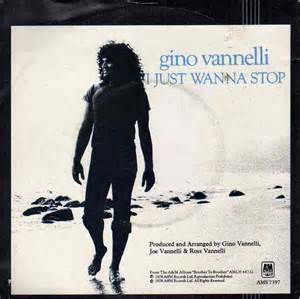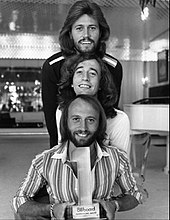
Saturday Night Fever is the soundtrack double album from the 1977 film Saturday Night Fever starring John Travolta. The soundtrack was released on November 15, 1977 by RSO Records. Prior to the release of Thriller by Michael Jackson, Saturday Night Fever was the best-selling album in music history, and still ranks among the best-selling soundtrack albums worldwide, with sales figures of over 40 million copies.

Gino Vannelli is a Canadian rock singer and songwriter who had several hit songs in the 1970s and 1980s. His best-known singles include "People Gotta Move" (1974), "I Just Wanna Stop" (1978), "Living Inside Myself" (1981) and "Wild Horses" (1987).

"Night Fever" is a song written and performed by the Bee Gees. It first appeared on the soundtrack to Saturday Night Fever on RSO Records. Producer Robert Stigwood wanted to call the film Saturday Night, but singer Robin Gibb expressed hesitation at the title. Stigwood liked the title Night Fever but was wary of marketing a movie with that name. The song bounded up the Billboard charts while the Bee Gees’ two previous hits from Saturday Night Fever soundtrack were still in the top ten. The record debuted on the Billboard Hot 100 Chart at #76, then leaped up 44 positions to #32. It then moved: 32–17–8–5–2–1. It remained at #1 for eight weeks, and ultimately spent 13 weeks in the top 10. For the first five weeks that "Night Fever" was at #1, "Stayin' Alive" was at #2. Also, for one week in March, Bee Gees related songs held five of the top positions on the Hot 100 chart, and four of the top five positions, with "Night Fever" at the top of the list. The B-side of "Night Fever" was a live version of "Down the Road" taken from the Bee Gees 1977 album, Here at Last... Bee Gees... Live.

"Stayin' Alive" is a song written and performed by the Bee Gees from the Saturday Night Fever motion picture soundtrack. The song was released in December 1977 by RSO Records as the second single from the Saturday Night Fever soundtrack. The band wrote the song and co-produced it with Albhy Galuten and Karl Richardson. It is one of the Bee Gees' signature songs. In 2004, "Stayin' Alive" was placed at No. 189 by Rolling Stone on their list of the 500 Greatest Songs of All Time. The 2021 updated Rolling Stone list of 500 Greatest Songs placed "Stayin' Alive" at No. 99. In 2004, it ranked No. 9 on AFI's 100 Years...100 Songs survey of top tunes in American cinema. In a UK television poll on ITV in December 2011 it was voted fifth in The Nation's Favourite Bee Gees Song.

"Jive Talkin'" is a song by the Bee Gees, released as a single in May 1975 by RSO Records. This was the lead single from the album Main Course. It hit number one on the Billboard Hot 100 and top-five on the UK Singles Chart in the middle of 1975. Largely recognised as the group's comeback song, it was their first US top-10 hit since "How Can You Mend a Broken Heart" (1971).

"Baker Street" is a single by the British singer-songwriter Gerry Rafferty, released in February 1978. It won the 1979 Ivor Novello Award for Best Song Musically and Lyrically and reached the top three in the UK, US and elsewhere. The song is known for its saxophone riff, written by Rafferty and performed by Raphael Ravenscroft.

"You Should Be Dancing" is a song by the Bee Gees, from the album Children of the World, released in 1976. It hit No. 1 for one week on the American Billboard Hot 100, No. 1 for seven weeks on the US Hot Dance Club Play chart, and in September the same year, reached No. 5 on the UK Singles Chart. The song also peaked at No. 4 on the Billboard Soul chart. It was this song that first launched the Bee Gees into disco. It was also the only track from the group to top the dance chart.

City to City is the second solo studio album by Scottish singer-songwriter Gerry Rafferty, released on 20 January 1978 by United Artists Records. It was Rafferty's first solo release in six years—and first release of any kind since 1975—due to his tenure in the band Stealers Wheel and subsequent legal proceedings which prevented Rafferty from releasing any new solo recordings for the next three years. The album was well received, peaking at No. 1 in the US and going Platinum, as well as reaching No. 6 in the UK Albums Chart and achieving Gold status. "Baker Street", "Right Down the Line" and "Home and Dry" were hits on the American charts.

"How Deep Is Your Love" is a ballad written and recorded by the Bee Gees in 1977 and released as a single in September of that year by RSO Records. It was ultimately used as part of the soundtrack to the film Saturday Night Fever. It was a number-three hit in the United Kingdom and Australia. In the United States, it topped the Billboard Hot 100 on 24 December 1977 and stayed in the Top 10 for 17 weeks. It spent six weeks atop the US adult contemporary chart. It is listed at No. 27 on Billboard's All Time Top 100. Alongside "Stayin' Alive" and "Night Fever", it is one of the group's three tracks on the list. The song was covered by Take That for their 1996 Greatest Hits album, reaching No. 1 on the UK Singles Chart for three weeks.
The Juno Awards of 1979, representing Canadian music industry achievements of the previous year, were awarded on 21 March 1979 in Toronto at a ceremony hosted by Burton Cummings at the Harbour Castle Hilton Convention Centre.
"If I Can't Have You" is a disco song written by the Bee Gees in 1977. The song initially appeared on the Saturday Night Fever soundtrack in a version by Yvonne Elliman, released in November 1977. The Bee Gees' own version appeared a month later as the B-side of "Stayin' Alive".

"Immortality" is a pop song recorded by Canadian singer Celine Dion for her fifth English-language studio album, Let's Talk About Love (1997). It was written by the Bee Gees, who also recorded backing vocals. Produced by Walter Afanasieff, "Immortality" was released as a single on 5 June 1998, outside the United States. It became a top ten single in Europe and a top forty single in Canada and Australia. Later, "Immortality" was included on the international editions of Dion's greatest hits albums, All the Way... A Decade of Song (1999), My Love: Essential Collection (2008) and The Best So Far... 2018 Tour Edition (2018).

"(Love Is) Thicker Than Water" is a song performed by Andy Gibb, released in September 1977 as the second and final single by RSO Records from his debut album, Flowing Rivers (1977). The song was his second single that topped the US Billboard Hot 100. It was mainly written by Barry Gibb, with help from Andy Gibb and produced by Gibb-Galuten-Richardson. The B-side of this song was "Words and Music" in the US, but "Flowing Rivers" in the UK. It became a gold record.

"Shadow Dancing" is a disco song performed by English singer-songwriter Andy Gibb. The song was released in April 1978 as the lead single by RSO Records from his second studio album of the same name. The song reached number one for seven consecutive weeks on the Billboard Hot 100 in 1978. It was written by Andy and his older brothers, Barry, Maurice and Robin Gibb and Albhy Galuten arranged the song with Barry Gibb. While Andy Gibb would have three more Top 10 hits in the U.S., this would be his final chart-topping hit in the United States. The song became a platinum record.

"More Than a Woman" is a song by musical group the Bee Gees, written by Barry, Robin, and Maurice Gibb for the soundtrack to the film Saturday Night Fever. It became a regular feature of the group's live sets from 1977 until Maurice Gibb's death in 2003 and was often coupled with "Night Fever".

Brother to Brother is the sixth studio album by Canadian singer Gino Vannelli. Despite its success - the biggest of Vannelli's career - it was also his last for A&M Records. The album was released in September 1978 and featured "I Just Wanna Stop", Vannelli's highest-charting single to date in both the US and Canada, where the single reached #4 and #1 respectively. Two other singles were released from the LP, "Wheels of Life", and "The River Must Flow".

"I Just Wanna Stop" is a song by Canadian singer/songwriter Gino Vannelli. Released as a single in August 1978, it remains his biggest hit single to date, reaching No. 1 in his native Canada and No. 4 on the U.S. Billboard Hot 100. It appears on his sixth album, Brother to Brother. The recording was produced by Gino and his brothers, Joe and Ross Vannelli; the song was written by Ross. It received a nomination for Grammy Award for Best Male Pop Vocal Performance.


















